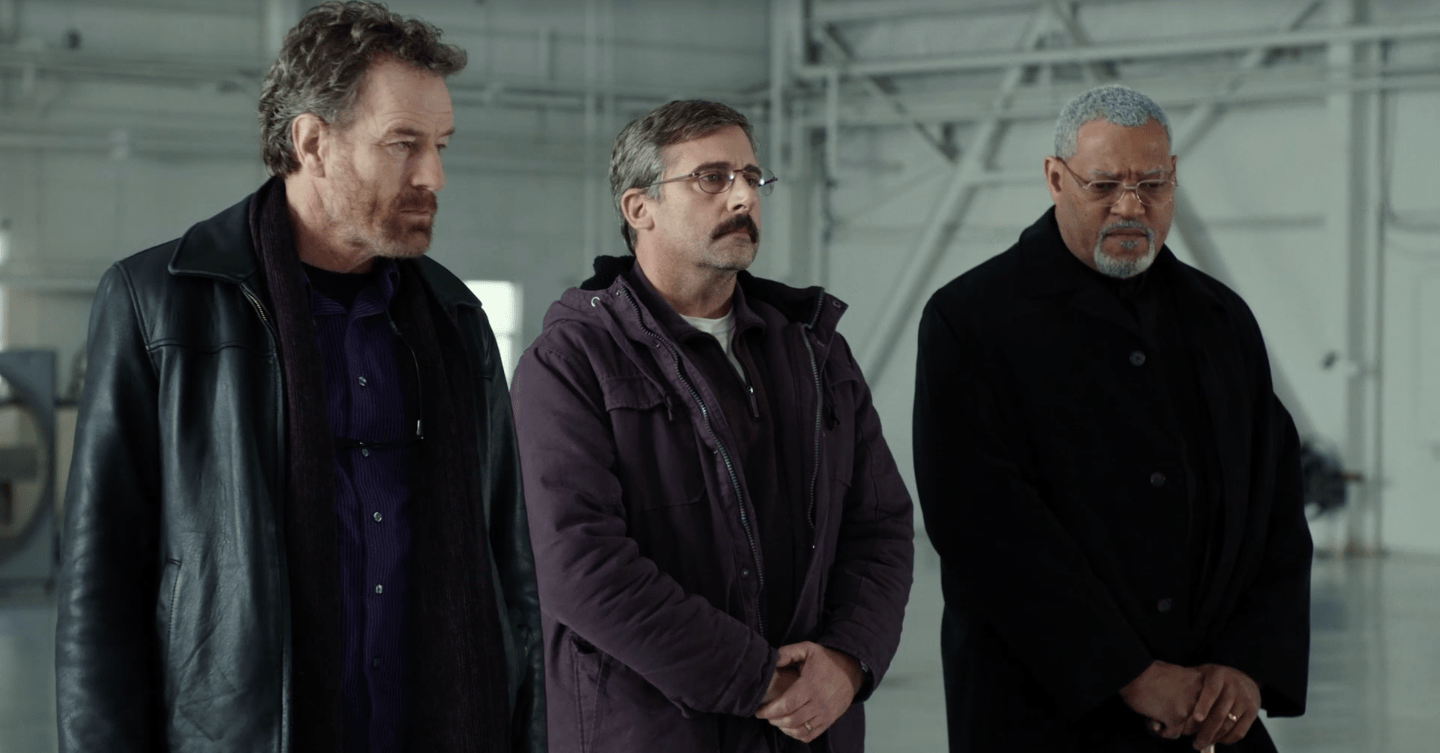By Mark Saldana
Rating: 3.5 (Out of 4 Stars)
Director Richard Linklater’s newest movie serves as a loose adaptation of Darryl Ponicsan’s novel Last Flag Flying. The movie juxtaposes the past experiences of war veterans with those of active military currently serving in a questionable war. Much like some of Linklater’s previous movies, this latest entry features superb performances by the cast in a very dialogue heavy narrative. With tremendous talents Bryan Cranston, Steve Carell, and Lawrence Fishburne in the lead roles, Last Flag Flying is a feast of thespian magnificence which makes for gut-busting comedy, compelling melancholy, and contemplative reflection.
Thirty years after they parted ways, three Vietnam War veterans get together for an unexpected reunion. Once a rambunctious Marine, Sal Nealon (Bryan Cranston) scrapes a living and drinks heavily from his own supply as owner of a run-down, struggling bar. On one particular night, his old Navy buddy Larry “Doc” Shepherd enters his bar and two catch up over a night of drinking. Having already looked up the location of the third member of their trio, Doc convinces Sal to come with him to visit their old friend Richard Mueller (Lawrence Fishburne). Mueller, who was also a wild Marine like Sal, has reformed his life and become a Christian minister in a church. Over an awkward meal at Mueller’s home, Doc asks his old friends to accompany him to pick up the body of his beloved son who was killed while serving in Iraq.
Richard Linklater’s latest film is very well written, directed and acted, but was developed in a somewhat peculiar way. Based on the novel of the same name by Darryl Ponicsan, Last Flag Flying (the movie) serves as an unofficial/spiritual sequel to Hal Ashby’s The Last Detail, a 1973 film which has deservedly received much respect and acclaim. Ponicsan, who also wrote The Last Detail novel prior to its film adaptation, got inspired to write a sequel novel with the same characters much later after 9/11 and the US war against Iraq. Linklater and Ponicsan later adapted this novel for film, but decided to change the names of the characters and some of their backstories to tell a slightly different, but similar tale. Though I highly enjoyed and appreciated Linklater’s movie, I still question the reasoning behind the changes that were made. As a big fan of The Last Detail, part of me really would have preferred a direct sequel to the movie.
That aside, I still very much loved this film and was marveled by Linklater’s writing, direction and the performances by the cast. The film does have somewhat questionable moment where a foreshadowed source of conflict never leads to anything. Linklater’s signature style of letting his characters tell the story and backstories works well and definitely feels in tune with Ashby’s film which has a few similar settings. The juxtaposition between two different generations of military offers some fascinating perspectives by people serving their country despite the conflicting feelings they have with their government and military leaders. Linklater and Ponicsan also deal with the harsh realities of war the and tolls that wars take on the veterans. It all makes for compelling cinema, but the filmmakers and their characters include the right amount of humor to make it all more palatable. After all, life does have its really hard times, but it also offers some simple pleasures and joys.
Regarding the acting, I sat watching this film in awe of the talent of the three lead actors on screen. Bryan Cranston is absolutely perfect for the role of Sal Nealon, a wild, hard-drinking, and brutally honest skirt chaser who is very much like the older version of Jack Nicholson’s Billy “Badass” Buddusky in The Last Detail. Laurence Fishburne delivers an eloquent and ruminating performance as the Rev. Richard Mueller. Hints of Mueller’s past wild attitude and more crass vocabulary permeate occasionally whenever he reverts back to the Marine he once was. Steve Carell offers a sweet, reserved and melancholy performance as Larry “Doc” Shepherd, a man mourning over his son and not knowing exactly how to feel about his son’s death. His character often serves as a mediator between Sal’s devilish troublemaker and Richard’s devout Christian voice of reason. The three actors share a wonderful chemistry together. The film also features great performances by J. Quinton Johnson, Yul Vazquez, and Deanna Reed Foster.
Though not as iconic or phenomenal as Hal Ashby’s The Last Detail, Linklater’s almost-sequel makes for a powerful and fitting follow up movie. Fans of the Ashby film will probably feel similarly, but it will be the die hard Linklater fans who will probably enjoy this film more. I feel it is another important film for people to see in order to appreciate what war veterans go through. It is also an impressive showcase for three amazing actors working in Hollywood today.
